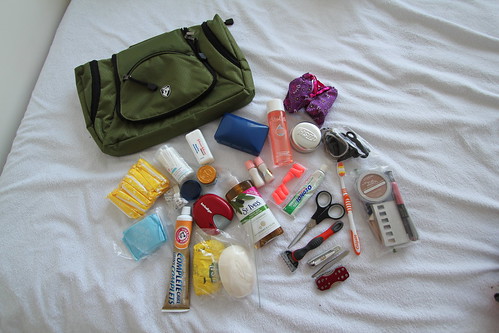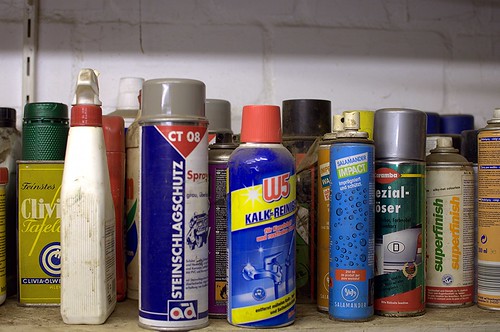German Vocab: Cleaning and Care Products Posted by Constanze on Jul 29, 2016 in Language
Guten Tag! You may recall Larissa writing some very helpful vocabulary posts (here and here) to take with you when you go grocery shopping. But what about the German words for all the other essentials we buy week in, week out? In this post we’ll go over some common Reinigungsmittel (cleaning products) and Pflegeprodukte (care products).
Firstly, a few general terms, all of which you might see in use, and some which are used interchangeably:
das Lebensmittel – food
das Reinigungsmittel – cleaning products
die Pflegeprodukte – care products
die Hygieneprodukte – hygiene products
das Waschmittel – washing products in liquid, gel or powder form – eg. detergent
die Babypflege – care products for babies
die Haushaltspflege – household care products
das Putzmittel – cleaning products
Now let’s move on to the specifics.
For the body – für den Körper
Care products – Die Pflegeprodukte
Soap – die Seife
Toothpaste – die Zahnpasta
Toothbrush – die Zahnbürste
Mouthwash – die Mundspülung / das Mundwasser
Shampoo – das Shampoo / das Haarwaschmittel
Hair conditioner – die Haarspülung / die Haarkur
Deodorant – das Deodorant
Sanitary towels – die Damenbinde
Razor – das Rasiermesser / der Rasierer
Moisturiser – die Feuchtigkeitscreme
**Did you know?**
The German word for a toiletry bag is a Kulturbeutel, which literally means ‘culture purse’! You can read more about that quirky word right here.
For the home – für Zuhause
Cleaning products – Das Reinigungsmittel
Laundry detergent – das Waschmittel
Fabric softener – der Weichspüler
Sponge – der Schwamm
Washing up liquid – das Geschirrspülmittel
Scourer – der Topfkratzer
Toilet paper – das Klopapier/das Toilettenpapier
Kitchen roll – die Küchenrolle
Toilet cleaner – der WC-Reiniger
Bath cleaner – der Badreiniger
Antibacterial spray – der (Ober)Flächenreiniger
All-purpose cleaner – der Allzweckreiniger
Floor cleaner – der Bodenreiniger
Window cleaner – der Fensterreiniger
Bleach – das Bleichmittel
Dusting cloth – das Staubtuch
Bin bags – die Müllsäcke
- Words ending in Pflege (care) take the feminine form (die).
- Words ending in Reiniger (cleaner) take the masculine form (der).
- Words ending in Mittel (means) take the neuter form (das).
**Did you know?**
The Germans have a tradition called Kehrwoche for apartment dwellers, in which residents take it in turns to clean the apartment building. They also have a great word for someone who has a bit of an obsession with cleaning! You can read about those words right here.
I hope this has been useful! Next time you go to buy your toiletries & cleaning essentials in a German-speaking country, why not print out this vocabulary list as a handy guide?
Bis bald!
Constanze

Build vocabulary, practice pronunciation, and more with Transparent Language Online. Available anytime, anywhere, on any device.
About the Author: Constanze
Servus! I'm Constanze and I live in the UK. I'm half English and half German, and have been writing about German language and culture on this blog since 2014. I am also a fitness instructor & personal trainer.







Comments:
Allan Mahnke:
These are always so helpful. Thank you! May I request an explanation of a bit of grammar? I am puzzled by the frequent use of the definite article with a proper name, for example, die Maria, oder der Hans. The meaning is always completely clear. I see this regularly in written German, but have never been able understand why the article is used. It seems to happen whether the context is colloquial or formal, and I am unable to identify a regional usage. Although, a novel I’m reading at the moment, Ave Vinum, (Carsten Sebastian Henn), which is set south of Cologne, near Belgium, seems to use the article before proper names more often than usual. (That may be my imagination!)
Thanks!
Constanze:
@Allan Mahnke Thanks Allan – very interesting question! I’ll look into that and see what I can come up with. 🙂
Brightstar:
Constanze
i find your postings very practical, useful and some times funny. I also find that your writing style used in your blog helps me to retain (anchor) new words.
I wonder if you could write a post on the usage of some of the most used particles such as doch, noch, mal etc.
Regards
Brightstart
Constanze:
@Brightstar Hi Brightstar! Glad you liked the post and that you find it helpful! Always nice to hear. :
You might be interested in this post about doch, ja, mal etc. from the archives: https://blogs.transparent.com/german/the-words-%e2%80%9cmal%e2%80%9d-%e2%80%9cja%e2%80%9d-and-%e2%80%9cdoch%e2%80%9d-in-german-speech/
Constanze x
Mehrdad:
superrrrrrrrrrrrrrrrrrrrrrrrrrrrrrrrrrrrrrrrrrrrrrrrrrrrrrrrrrrrrrrrrrrrrrrrrrrrrrrrrrrrrrrr
Mehrdad:
primaaaaaaaaaaaaaaaaaaaaaaaaaa